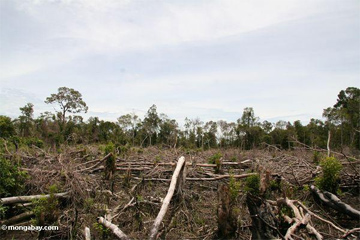Indonesia is preparing to establish a trust fund to reduce deforestation, reports the Jakarta Globe.
The National Forest Trust Fund, which will be raised by the Ministry of Forestry from foreign donors, would be an expansion of a pilot initiative established last year in a debt-for-nature swap between Indonesia and the United States, according to Hadi Daryanto, director general of forest production at the Ministry of Forestry. The money, which would be managed by an independent group, would finance conservation projects and promote sustainable forest management.
Carbon accounting
|
|
Hadi also said Indonesia would develop its own forest carbon accounting system, one that would be “less complicated” than that employed by the International Panel on Climate Change, according to the Jakarta Globe.
Hadi told the paper that the methodology would allow concession holders to predict how much they could earn from tree-planting.
“One of the ways to store carbon is to plant trees, and that’s why it’s important that we control our carbon stock” from planting activities, Hadi was quoted as saying. “This will also help concessionaires predict how much investment they can get in the carbon market.”
Forest funds
Southeast Asia remains the only major forest region without a forest fund. In Africa, several countries have established the Congo Basin Forest Fund, while Brazil — which accounts for the bulk of the world’s tropical forest cover — has set up the $20 billion Amazon Fund. Both funds rely on donations from rich, industrialized nations, but it remains unclear how these funds will be operate under REDD, a proposed climate change mitigation mechanism backed by the U.N.
Indonesia has the world’s second highest rate of forest loss after Brazil. In some years, emissions from forest destruction and degradation of peat swamps make the country the third largest emitter of greenhouse gases after China and the United States.
Related articles
Indonesian government report recommends moratorium on peatlands conversion
(01/19/2010) A study issued by Indonesian government recommends a moratorium on peatlands conversion in order to meet its greenhouse gas emissions target pledged for 2020, reports the Jakarta Post. The report, commissioned by the National Development Planning Agency (Bappenas), says that conversion of peatlands accounts for 50 percent of Indonesia’s greenhouse gas emissions but only one percent of GDP. A ban on conversion would therefore be a cost-effective way for the country to achieve its goal of reducing carbon emissions 26 percent from a projected baseline by 2020. But the recommendation is likely to face strong resistance from plantation developers eager to expand operations in peatland areas. Last year the Agricultural Ministry lifted a moratorium on the conversion of peatlands of less than 3 meters in depth for oil palm plantations. Environmentalists said the move would release billions of tons of carbon dioxide.
Brazil’s plan to save the Amazon rainforest

(06/02/2009) Accounting for roughly half of tropical deforestation between 2000 and 2005, Brazil is the most important supply-side player when it comes to developing a climate framework that includes reducing emissions from deforestation and forest degradation (REDD). But Brazil’s position on REDD contrasts with proposals put forth by other tropical forest countries, including the Coalition for Rainforest Nations, a negotiating block of 15 countries. Instead of advocating a market-based approach to REDD, where credits generated from forest conservation would be traded between countries, Brazil is calling for a giant fund financed with donations from industrialized nations. Contributors would not be eligible for carbon credits that could be used to meet emission reduction obligations under a binding climate treaty.
REDD must address corruption to save rainforests in Indonesia, says report

(01/13/2010) The Indonesian government squandered billions of dollars in funds set aside for reforestation through corruption and mismanagement in the 1990s, raising important questions as the country prepares for the influx of money from a proposed climate change mitigation scheme known as REDD+ (reduced emissions from deforestation and degradation), warns a new report released Tuesday by the Center for International Forestry Research (CIFOR), a forest policy research group.
Indonesia to plant and restore vast area of forest to reach emissions target
(01/07/2010) Indonesia will rehabilitate degraded forests and plant millions of hectares of new forests to meet its target of reducing greenhouse gas emissions 26 percent from projected levels by 2020, reports Reuters.
